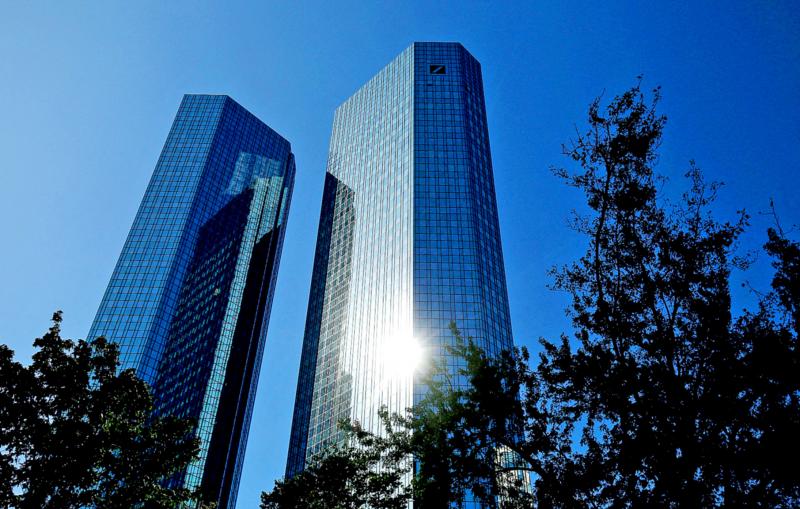Deutsche Bank AG shareholders should not sign off on management’s actions for the past year, an influential advisory firm recommended, citing ongoing legal investigations against the lender.
Proxy adviser Glass Lewis listed probes against Deutsche Bank’s asset manager DWS Group and an unidentified management board member in connection with a tax evasion scheme known as cum-ex, a report published on Sunday said.
It also cited a raid last week related to the bank’s reporting on potential money laundering.

Photo: Reuters
While Glass Lewis said it is “unaware of any substantial indications to suggest that management board members overwhelmingly failed to fulfill their duty to shareholders,” it recommended shareholders “abstain from voting on ratification proposals as a matter of caution” as long as the outcome of the various probes is uncertain.
Deutsche Bank chief executive officer Christian Sewing and departing supervisory board chairman Paul Achleitner will likely seek to highlight at the May 19 meeting what they see as a successful turnaround of the lender over the past three years, yet the Glass Lewis report also shows how much the string of new regulatory and legal issues have cast a shadow over the German lender, despite a strong rise in profitability.
The issues cited involve allegations against DWS that it overstated how much it factors environmental, social and governance considerations into its investment decisions, and Deutsche Bank’s role in a tax scam known as cum-ex that allegedly has cost German taxpayers billions of euros.
Outgoing Deutsche Bank chief risk officer Stuart Lewis is being investigated over his role in the transactions, Bloomberg reported last year.
This year’s meeting will feature a motion by one investor to oust Sewing, even though Deutsche Bank has dismissed the proposal, and labeled it as “riddled with half-truths and conspiracy theories.”
The meeting will be the last for Achleitner, as he is set to be succeeded as chairman by former Aegon NV chief executive officer Alexander Wynaendts.
Glass Lewis recommended voting for Wynaendts.
The adviser also recommended voting against ratifying Deutsche Bank’s remuneration report, saying Sewing’s base salary was “excessive,” and criticizing “poor” disclosure on annual bonus metrics and performance targets.
Sewing earned 8.8 million euros (US$9.3 million) last year.
“We are concerned about the high base salaries paid to management board members, some of which have been further increased in the past year,” the report said.

Taiwan Semiconductor Manufacturing Co (TSMC, 台積電) last week recorded an increase in the number of shareholders to the highest in almost eight months, despite its share price falling 3.38 percent from the previous week, Taiwan Stock Exchange data released on Saturday showed. As of Friday, TSMC had 1.88 million shareholders, the most since the week of April 25 and an increase of 31,870 from the previous week, the data showed. The number of shareholders jumped despite a drop of NT$50 (US$1.59), or 3.38 percent, in TSMC’s share price from a week earlier to NT$1,430, as investors took profits from their earlier gains

In a high-security Shenzhen laboratory, Chinese scientists have built what Washington has spent years trying to prevent: a prototype of a machine capable of producing the cutting-edge semiconductor chips that power artificial intelligence (AI), smartphones and weapons central to Western military dominance, Reuters has learned. Completed early this year and undergoing testing, the prototype fills nearly an entire factory floor. It was built by a team of former engineers from Dutch semiconductor giant ASML who reverse-engineered the company’s extreme ultraviolet lithography (EUV) machines, according to two people with knowledge of the project. EUV machines sit at the heart of a technological Cold

TAIWAN VALUE CHAIN: Foxtron is to fully own Luxgen following the transaction and it plans to launch a new electric model, the Foxtron Bria, in Taiwan next year Yulon Motor Co (裕隆汽車) yesterday said that its board of directors approved the disposal of its electric vehicle (EV) unit, Luxgen Motor Co (納智捷汽車), to Foxtron Vehicle Technologies Co (鴻華先進) for NT$787.6 million (US$24.98 million). Foxtron, a half-half joint venture between Yulon affiliate Hua-Chuang Automobile Information Technical Center Co (華創車電) and Hon Hai Precision Industry Co (鴻海精密), expects to wrap up the deal in the first quarter of next year. Foxtron would fully own Luxgen following the transaction, including five car distributing companies, outlets and all employees. The deal is subject to the approval of the Fair Trade Commission, Foxtron said. “Foxtron will be

INFLATION CONSIDERATION: The BOJ governor said that it would ‘keep making appropriate decisions’ and would adjust depending on the economy and prices The Bank of Japan (BOJ) yesterday raised its benchmark interest rate to the highest in 30 years and said more increases are in the pipeline if conditions allow, in a sign of growing conviction that it can attain the stable inflation target it has pursued for more than a decade. Bank of Japan Governor Kazuo Ueda’s policy board increased the rate by 0.2 percentage points to 0.75 percent, in a unanimous decision, the bank said in a statement. The central bank cited the rising likelihood of its economic outlook being realized. The rate change was expected by all 50 economists surveyed by Bloomberg. The